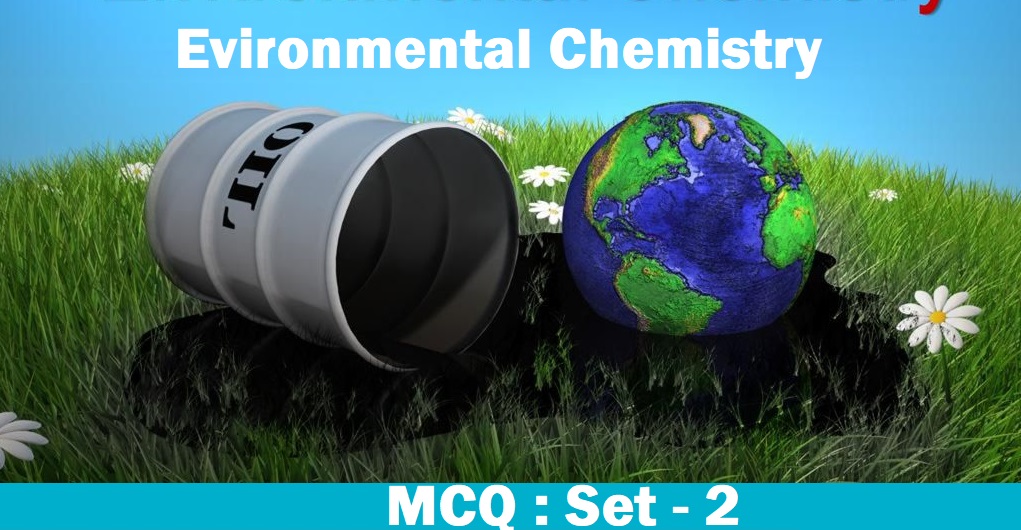CBSE Class 11 Chemistry Chapter 14 Environmental Chemistry Multiple Choice Questions with Answers. MCQ Questions Class 11 Chemistry Environmental Chemistry with Answers was Prepared Based on Latest Exam Pattern. Students can solve NCERT Class 11 Chemistry Environmental Chemistry MCQs with Answers to know their preparation level.
Students who are searching for NCERT MCQ Questions for Class 11 Chemistry Environmental Chemistry with Answers are compiled here to get good practice on all fundamentals. Know your preparation level on MCQ Questions for Class 11 Chemistry with Answers. You can also verify your answers from our provided MCQ Class 11 Chemistry Environmental Chemistry with Answers. So, ace up your preparation with MCQ of Chapter 14 Chemistry Objective Questions.
MCQ Questions Class 11 Chemistry Environmental Chemistry with Answers - Set - 2
Question 1:
Question. Which of the following is/are the hazardous pollutant(s)present in automobile exhaust gases?
(i) N2 (ii) CO
(iii) CH4 (iv) Oxides of nitrogen
(a) (ii) and (iii)
(b) (i) and (ii)
(c) (ii) and (iv)
(d) (i) and (iii)
Correct Answer – (C)
Question 2 :
Question. The uppermost region of the atmosphere is called
(a) Ionosphere
(b) Stratosphere
(c) Troposphere
(d) Exosphere
Correct Answer – (D)
Question 3 :
Question. High concentration of which of the following in atmosphere leads to stiffness of flower buds which eventually fall off from plants?
(a) NO2
(b) SO2
(c) CFC
(d) Smog
Correct Answer – (B)
Question 4 :
Question. The region which is greatly affected by air pollution is
(a) Thermosphere
(b) Stratosphere
(c) Troposphere
(d) Mesosphere
Correct Answer – (C)
Question 5 :
Question. The type of pollution caused by spraying of DDT is
(a) air and soil
(b) air and water
(c) air
(d) air, water and soil
Correct Answer – (D)
MCQ Questions Class 11 Chemistry Environmental Chemistry with Answers
Question 6 :
Question. The irritant red haze in the traffic and congested placesis due to presence of which of the following ?
(i) Oxides of sulphur
(ii) Oxides of nitrogen
(iii) Carbon dioxide
(iv) Mists, smoke and dust
(v) Smog
(a) (i), (iv) and (v)
(b) (iii) only
(c) (ii) only
(d) (ii) and (v)
Correct Answer – (C)
Question 7 :
Question. What is DDT among the following ?
(a) Greenhouse gas
(b) A fertilizer
(c) Biodegradable pollutant
(d) Non-biodegradable pollutant
Correct Answer – (D)
Question 8 :
Question. The region containing water vapour is
(a) thermosphere
(b) stratosphere
(c) troposphere
(d) mesosphere
Correct Answer – (C)
Question 9 :
Question. Which of the following is the coldest region of atmosphere ?
(a) Thermosphere
(b) Mesosphere
(c) Troposphere
(d) Stratosphere
Correct Answer – (B)
Question 10 :
Question. Which one of the following statement is not true?
(a) pH of drinking water should be between 5.5 – 9.5.
(b) Concentration of DO below 6 ppm is good for the growth of fish.
(c) Clean water would have a BOD value of less than 5 ppm.
(d) Oxides of sulphur, nitrogen and carbon, are the most widespread air pollutant
Correct Answer – (B)
- NCERT Solutions Class 11 Chemistry Chapter 1 : Some Basic Concepts of Chemistry
- NCERT Solutions Class 11 Chemistry Chapter 2 : Structure Of The Atom
- NCERT Solutions Class 11 Chemistry Chapter 3 : Classification of Elements and Periodicity in Properties
- NCERT Solutions Class 11 Chemistry Chapter 4 : Chemical Bonding and Molecular Structure
- NCERT Solutions Class 11 Chemistry Chapter 5 : States of Matter
- NCERT Solutions Class 11 Chemistry Chapter 6 : Thermodynamics
- NCERT Solutions Class 11 Chemistry Chapter 7 : Equilibrium
- NCERT Solutions Class 11 Chemistry Chapter 8 : Redox Reactions
- NCERT Solutions Class 11 Chemistry Chapter 9 : Hydrogen
- NCERT Solutions Class 11 Chemistry Chapter 10 : The s-Block Elements
- NCERT Solutions Class 11 Chemistry Chapter 11 : The p-Block Elements
- NCERT Solutions Class 11 Chemistry Chapter 12 : Organic Chemistry: Some Basic Principles and Techniques
- NCERT Solutions Class 11 Chemistry Chapter 13 : Hydrocarbons
- NCERT Solutions Class 11 Chemistry Chapter 14 : Environmental Chemistry



